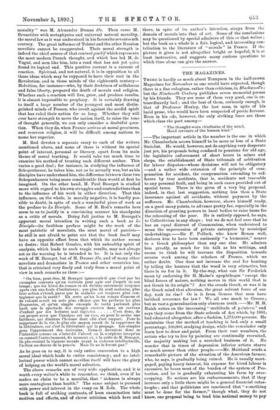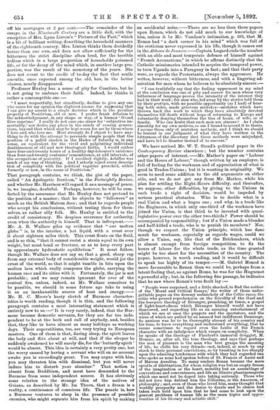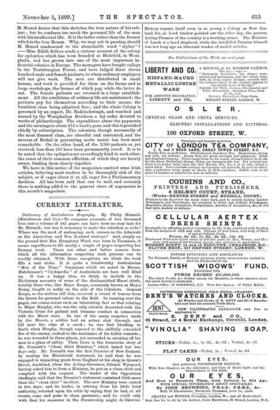THE MAGAZINES.
THERE is hardly as much about Tennyson in the half-crown Magazines for November as one would have expected, though there is a fine eulogium, rather than criticism, in Blackwood's ; but the Nineteenth Century publishes seven memorial poems by his friends. They are none of them very good, one is ex- traordinarily bad ; and the best of them, curiously enough, is that of Professor Huxley, the last man, in spite of his lucid prose, who would have been suspected of poetic fervour. Even in his ode, however, the only striking lines are those which class the poet among- " The thought-worn chieftains of the mind, Head servants of the human kind."
—The important article in the number is the one in which Mr. Chamberlain avows himself to be more or less of a State Socialist. He would, however, not do anything very desperate just yet, his proposals being confined to pensions for old age, the legislative enforcement of short hours in mines and shops, the establishment of State tribunals of arbitration for labour disputes—whose decisions will not be obligatory —and a rather wide extension of the principle of com- pensation for accident, the compensation extending to suf- ferers by true accidents, that is, accidents not traceable to any personal fault, and being in such cases provided out of special taxes. There is the germ of a very big proposal, indeed, in that last suggestion, nothing less than a State insurance against all accidents, without payment by the sufferers. Mr. Chamberlain, however, shows himself ready, on a good many points, to advance pretty far, especially in the direction of granting powers to local bodies to raise loans for the rehousing of the poor. He is entirely opposed, he says, to Collectivism in any shape ; but we do not feel sure that he has an equal distrust of Communism, when understood to mean the supersession of private enterprise by municipal undertakings.—Sir F. Pollock, who knew Renan well, declares him to have been eminently "a humanist," nearer to a Greek philosopher than any one else. He admires him greatly, as much for his talk as his writings, and seems to think he will increase the disposition towards serious work among the scholars of France, which we rather doubt. One does not increase the zeal for hunting by telling the hunters that the wood is very attractive, but there is no fox in it. By-the-way, what can Sir Frederick mean by endorsing Sir H. Maine's apophthegm "except the blind forces of nature, nothing moves in this world that is not Greek in its origin"? Are the creeds Greek, or was it in the Greek mind that altruism, the great solvent force of our day, took its rise ? Or is it from Greece that men have imbibed reverence for law P We all owe much to Greece ; but so vast a generalisation only obscures truth.—Mr. M. B. Finish writes on the increasing " multitude of painters," and says they come from the State schools of Art which, by 1891, had educated altogether, after a fashion, 1,273,000 persons. He maintains that the method of teaching is bad, only a small percentage, 100,000, studying design, while the remainder only learn how to draw and paint. From their vast numbers, the artists who try to live by painting are continually recruited, the majority making but a wretched business of it. No wonder that in times of depression inferior artists starve so much sooner than other people.—Mr. Maitland sends a remarkable picture of the situation of the American farmer, who, he says, is gradually being rained. He is usually mort- gaged, paying heavy interest, his expense for hired labour is excessive, he bears most of the burden of the system of Pro- tection, and he is gradually exhausting his farm by over- cropping. So serious are his embarrassments, that if they increase only a little there might be a general financial catas- trophe ; and that politicians are convinced that " something must be done for the farmer," though what, they do not know, one proposal being to lend him national money to pay off his mortgages at 2 per cent.—The remainder of the essays in the Nineteenth Century are a little dull, with the exception of Mrs. Lynn Linton's " Picture of the Past," which is a bit of brilliant writing, describing the household manners
of the eighteenth century. Mrs. Linton thinks them decidedly better than our own, and does not allow sufficiently for the bitterness the strict discipline often bred, for the terrible tedium which in a large proportion of households poisoned life, or for the decay of the mind which, in another large pro- portion, was the result of the monotony of the years. She does not count to the credit of to-day the fact that senile amentia, once expected among the old, has, in the better classes, nearly disappeared.
Professor Huxley has a sense of pity for Comtists, but he is not going to embrace their faith. Indeed, he thinks it rather a contemptible one :-
" I must respectfully, but steadfastly, decline to give any one who cares for my opinion the slightest excuse for supposing that I can give my assent to a single doctrine which is the peculiar property of Positivism, old or new. I prefer frank Atheism to the acknowledgement, in any shape or way, of a human • Grand Etre supreme.' I really do not care one straw for subjective im- mortality,' nor desire any place in the minds of coming genera- tions, beyond that which may be kept warm for me by those whom I love and who love me. Most strongly do I object to have any- thing to do with the attempt to persuade simple people that the position of a pallid shadow in the Hades of futurity is, in any sense, an equivalent for the vivid and palpitating individual deathlessness of old and new theological faiths. I would rather have four-and-twenty hours of a healthy day-labourer's existence than four-and-twenty centuries' remembrance, at odd intervals, of the occupations of posterity. If I recollect rightly, Achilles was much of my way of thinking. And I utterly reject every descrip- tion of complicity with the political vagaries preached, either formerly or now, in the name of Positivism."
That paragraph contains, we think, the gist of the paper,
called " An Apologetic Irenicon," in the Fortnightly Review, and whether Mr. Harrison will regard it as a message of peace,
is, we imagine, doubtful. Perhaps, however, he will be com- forted by the assurance that Mr. Huxley does not pretend to the position of a master ; that he objects to " followers " as much as the British Matron does ; and that he regards people who accept his conclusions, without testing them for them- selves, as rather silly folk. Mr. Huxley is entitled to the credit of consistency. He despises reverence for authority, even when the authority is himself. That is infrequent.— Mr. A. R. Wallace piles up evidence that " our molten globe " is, in the interior, a hot liquid, with a crust over it about eighteen miles thick. This crust floats on the fluid, and is so thin, "that it cannot resist a strain equal to its own weight, but must bend or fracture, so as to keep every part in approximate hydrostatic equilibrium." It must follow, though Mr. Wallace does not say so, that a good, sharp rap from any external body of considerable weight, would jar the crust of the world, so that it might tumble in bits upon the molten lava which really composes the globe, carrying the human race and its cities with it. Fortunately, the jar is not probable ; and we may remain ignorant for ever of the central fire, unless, indeed, as Mr. Wallace conceives to be possible, we should in some future age take to using it as an inexhaustible source of heat and energy.
Mr. H. C. Moore's hasty sketch of Burmese character- istics is worth reading, though it is thin, and the following paragraph contains a most interesting statement which is entirely new to us :—" It is very rarely, indeed, that the Bur- mese become domestic servants, for they are far too inde- pendent to be at the beck and call of anybody, and, besides that, they like to have almost as many holidays as working days. Their superstitions, too, are very trying to European masters. One of them is that, during sleep, the spirit leaves the body and flits about at will, and that if the sleeper be suddenly awakened he will surely die, for the' butterfly spirit' would be absent. This idea is certainly a very pretty one, but the worry caused by having a servant who will on no account awake you is exceedingly great. Yoa may argue with him, you may threaten him with dismissal, but you will never induce him to disturb your slumber." That notion is absent from Buddhism, and must have descended to the Burmese from some independent source. It has obviously some relation to the strange idea of the natives of Guiana, as described by Mr. Im Thurn, that a dream is a reality, a continuance of conscious life. The puzzle is, how a Burmese ventures to sleep in the presence of possible enemies, who might separate him from his spirit by making
an accidental noise.—There are no less than three papers upon Renan, which do not add much to our knowledge of him, unless it be Mr. Vandam's intimation, p. 681, that M. Renan had "a dark corner in his mind" which was full of the eroticism never expressed in his life, though it comes out in the Abbesse de Jouarre.—Captain Lugard ends the number with an able and most temperate defence of himself against " French Accusations," in which he affirms distinctly that the Catholic missionaries intended to acquire the temporal power, to turn Uganda into a Paraguay in fact; and that their party were, as regards the Protestants, always the aggressors. He writes, however, without bitterness, and with a lingering ad- miration for men whom he believes to be absolutely sincere :— " I can truthfully say that the feeling uppermost in my mind at the conclusion was one of pity and sorrow for men whose very bitterness of language proves the intensity of the interest they had in their work ; for men who, led away by the stories told them by their protégés, with no possible opportunity (as I had) of hear- ing both sides, made grievous mistakes—mistakes which have thrown back the work to which they have absolutely devoted themselves till death without hope of returning to Europe and voluntarily denying themselves the ties of home, of wife, or of family. Who can doubt that such men are sincere ? As I claim sincerity for my own motives, so am I bound to accord it to theirs. I accuse them only of mistaken methods, and I think we should be lenient in our judgment of what they have written in the bitterness of the discovery that those methods were misjudged, and have lel to disaster instead of to success."
We have noticed Mr. W. T. Stead's political paper in the Contemporary Review elsewhere ; but the number contains other papers of interest. —Mr. IS/lather's paper on "Labour and the Hours of Labour," though written by an employer, is full of feeling for the workmen and of appreciation of what is good in Trades-Unions ; but it is wanting in originality. We seem to need some addition to the old arguments on either side, and we do not get any from Mr. Mather, while his plan for settling the Eight-Hours difficulty, and thereafter, we suppose, other difficulties, by giving to the Unions in each trade a right of decision, would be impeded by serious practical obstacles. Who is to decide what is a real Union and what a bogus one ; and why, in a trade like the Engineers, in which only one-third of the workmen have joined the Union, is that third to be invested with quasi- legislative power over the other two-thirds P Power should be accompanied by responsibility; but if a Union made a blunder and half-killed a trade, who is to punish its members P Nor, though we respect the Union principle, which has done mach for workmen, especially as regards wages, could we allow a Union, say, like that of the Brickmakers, which is almost exempt from foreign competition, to fix the hours of labour for the whole trade, as the time granted might be too short for the necessities of the country. The paper, however, is worth reading, and it would be difficult
to speak too highly of its temper.—M. Gabriel Monod is more favourable to Renan than we could be, perhaps from a latent feeling that, as against Rome, he was for the Huguenot a powerful ally; but, in the following fine passage, he indicates that he saw where Renan's true fault lay :-
" People were surprised, and a little shocked, to find the author of the Moral and Critical Essays,' the writer of those unfor- gettable pages on the dreamy melancholy of the Celtic races, the critic who poured reprehension on the frivolity of the Gaul and the bourgeois theology of Beranger, preaching, at times, a gospel of light-heartedness which Boranger himself would not have disavowed, and regarding life as an amusing entertainment of which we are at once the puppets and the spectators, and the wires of which are pulled by an amused but indifferent Demiurge. So anxious was he to be thoroughly abreast of his country and his time, to know everything and understand everything, that he seems sometimes to regard even the faults of the French character with an indulgence which verges on complicity, When he speaks of the theology of Flaubert's immortal druggist, M. Homais, as, after all, the true theology, and says that perhaps the man of pleasure is the man who best grasps the meaning of life, he chills his very friends—not, indeed, so much by any shock to their personal convictions, as by breaking in too sharply upon the admiring tenderness with which they had regarded one who spoke as none had spoken before of St. Francis of Assisi and of Marcus Aurelius. To many readers Renan became the mere apostle of dilettantism, for whom religion was but an empty dream of the imagination or the heart, morality but an assemblage of conventions and conveniences, and life an illusive phantasmagoria which one must not be duped into taking seriously. Those who did not love him dubbed him the Celimene, or the Anacreon, of philosophy ; and, even of those who loved him, many thought that worldly prosperity and the desire to dazzle and to charm had taken such hold upon him that he had come to look upon the, gravest problems of human life as thw mere topics and oppor:
tunities of his literary and artistic skill." •
M. Monod denies that this sketches the true nature of his sub- ject; but be confuses too much the personal life of the man with his intellectual life. It is the latter rather than the former which is the true Renan. Why, we may ask in passing, should M. Monod condescend to the abominable word " stylist" P —Miss Edith Sellers sends a curious account of the colony for epileptics which has been founded at Bielefeld, in West- phalia, and has grown into one of the most important in- dustrial colonies in Europe. The managers have bought valleys in the Teutoburgian Forest, and have lodged there eleven hundred male and female patients, to whom ordinary employers will not give work. The men are distributed in small houses, and work is provided for them on the farms and in large workshops, the former of which pay, while the latter do not. The female patients are retained in a large establish- ment. All the conditions of ordinary life are maintained ; the patients pay for themselves according to their means, the humblest class being admitted free ; and the whole Colony is governed by an expert, Dr. Bodelschwingh, and watched and nursed by the Westphalian Brothers, a lay order devoted to works of philanthropy. The expenditure above the payments and the earnings is about £12 a head a year, and this is provided chiefly by subscription. The colonists, though necessarily of the most diseased class, are cheerful and contented, and the success of Bethel in preventing acute mania has been most remarkable. On the other hand, of the 3,300 patients as yet received, less than 250 have been permanently cured. It is to be noted that the epileptics are exceedingly kind to each other, the sense of their common affliction, of which they are keenly aware, binding them closely together.
We have in this notice of the magazines omitted some Irish articles, believing most readers to be thoroughly sick of the subject, or if eager about it at all, eager for a Parliamentary decision. All has been said that can be said, and certainly there is nothing added to the general store of arguments in this month's magazines.
























































 Previous page
Previous page